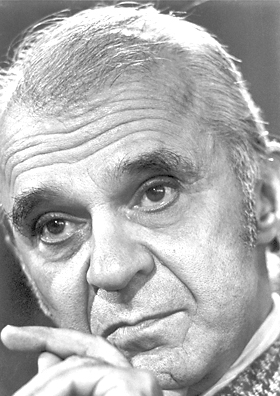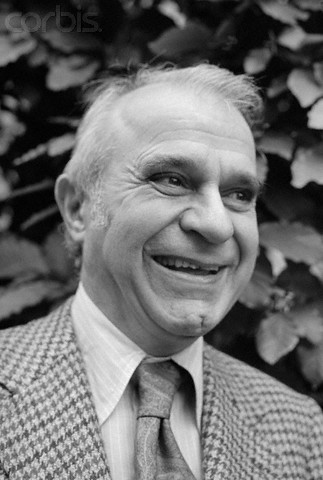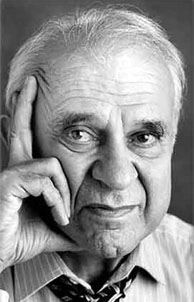<Back to Index>
- Economist Wassily Wassilyovich Leontief, 1905
- Writer Rusurrección María de Azkue, 1864
- 17th Prime Minister of Australia Harold Edward Holt, 1908
PAGE SPONSOR



Wassily Wassilyovich Leontief (Russian: Васи́лий Васи́льевич Лео́нтьев; August 5, 1905, Munich, Germany – February 5, 1999, New York), was a Russian - American economist notable for his research on how changes in one economic sector may have an effect on other sectors. Leontief won the Nobel Committee's Nobel Memorial Prize in Economic Sciences in 1973, and three of his doctoral students have also been awarded the prize (Paul Samuelson 1970, Robert Solow 1987, Vernon L. Smith 2002).
Wassily Leontief was born on August 5, 1905, in Munich, Germany, the son of Wassily W. Leontief (professor of Economics) and Slata (later Evgenia, called Genya) Leontief (née Becker). W. Leontief, Sr., belonged to a dynasty of old - believer merchants living in St. Petersburg since 1741. Genya Becker belonged to a wealthy Jewish family from Odessa. At 15 in 1921, Wassily, Jr., entered the University of Leningrad in present day St. Petersburg. He earned his Learned Economist degree (equivalent to Master of Arts) in 1924 at the age of 19.
Leontief sided with campaigners for academic autonomy, freedom of speech and in support of Pitirim Sorokin. As a consequence, he was detained several times by the Cheka. In 1925, he was allowed to leave the USSR, mostly because the Cheka believed that he was mortally ill with a sarcoma, a diagnosis that later proved false. He continued his studies at the University of Berlin and, in 1928 earned a Ph.D. degree in economics under the direction of Werner Sombart, writing his dissertation on Circular Flows in Economics.
From 1927 to 1930, he worked at the Institute for the World Economy of the University of Kiel. There he researched the derivation of statistical demand and supply curves. In 1929, he traveled to China to assist its ministry of railroads as an advisor.
In 1931, he went to the United States and was employed by the National Bureau of Economic Research.
During World War II, Leontief served as consultant at the U. S. Office of Strategic Services. Leontief joined Harvard University's department of economics in 1932 and in 1946 became professor of economics there. Around
1949, Leontief used the primitive computer systems available at the
time at Harvard to model data provided by the U.S. Bureau of Labor
Statistics to divide the U.S. economy into 500 sectors. Leontief modeled
each sector with a linear equation based on the data and used the
computer, the Harvard Mark II, to solve the system, one of the first significant uses of computers for mathematical modeling. Leontief
set up the Harvard Economic Research Project in 1948 and remained its
director until 1973. Starting in 1965, he chaired the Harvard Society of Fellows.
In 1975, Leontief joined New York University and founded and directed the Institute for Economic Analysis. In 1932, Leontief married poet Estelle Marks. Their only child, Svetlana Leontief Alpers, was born in 1936. As hobbies Leontief enjoyed fly fishing, ballet, and fine wines. He vacationed for years at his farm in West Burke, Vermont, but after moving to New York in the 1970s moved his summer residence to Lakeville, Connecticut. Leontief died in New York City on Friday, February 5, 1999 at the age of 93. His wife died in 2005. Leontief is primarily associated with the development of the linear activity model of General equilibrium and the use of input - output analysis that results from it. He has also made contributions in other areas of economics, such as international trade where he documented the Leontief paradox. He was also one of the first to establish the composite commodity theorem. Leontief
earned the Nobel Prize in economics for his work on input - output
tables. Input - output tables analyze the process by which inputs from
one industry produce outputs for consumption or for inputs for another
industry. With the input - output table, one can estimate the change in
demand for inputs resulting from a change in production of the final
good. The analysis assumes that input proportions are fixed; thus the
use of input - output analysis is limited to rough approximations
rather than prediction. Input - output was novel and inspired large -
scale empirical work; in 2010 its iterative method was recognized as an
early intellectual precursor to Google's PageRank. Leontief
used input - output analysis to study the characteristics of trade flow
between the U.S. and other countries, and found what has been named
Leontief's paradox; "this country resorts to foreign trade in order to economize its capital and dispose of its surplus labor, rather than vice versa", i.e., U.S. exports were relatively labor - intensive when compared to U.S. imports.
This is the opposite of what one would expect, considering the fact
that the U.S.'s comparative advantage was in capital - intensive goods.
According to some economists,
this paradox has since been explained as due to the fact that when a
country produces "more than two goods, the abundance of capital relative
to labor does not imply that the capital intensity of its exports
should exceed that of imports." Leontief
was also a very strong proponent of the use of quantitative data in the
study of economics. Throughout his life Leontief campaigned against
"theoretical assumptions and nonobserved facts". According to Leontief, too many economists were reluctant to "get their hands dirty" by working with raw empirical facts.
To that end, Wassily Leontief did much to make quantitative data more
accessible, and more indispensable, to the study of economics.